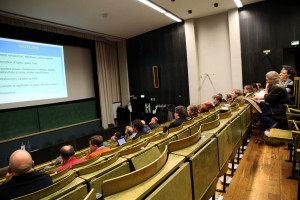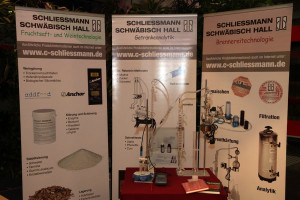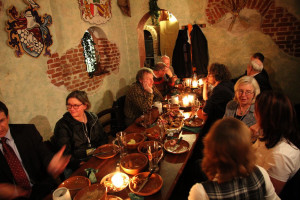Cold Climate Grape Brainstorming in Europe
Greetings from Neubrandenburg, Germany! I’ve just returned from attending VitiNord2012, an international cold climate grape growing conference that was held in Germany and Poland.

A VitiNord2012 conference session. Photo courtesy of VitiNord2012
I’m co-owner of Mac’s Creek Winery and Vineyards in Lexington Nebraska and Professor at the University of Nebraska at Kearney. Our 15 acre vineyard and winery were established 10 years ago. The grapes we grow, like many across the Midwest, are cold climate hybrids as we cannot plant any vines that can’t withstand -15 to -20 degrees Fahrenheit temperature in the winter. So I was looking forward to this opportunity to share knowledge with winemakers from across the world who have to deal with similarly cold conditions.
This is the third VitiNord; in 2006 it was held in Latvia, in 2009 in St. Hyacinth, Canada. The conference was jointly sponsored this year by the University of Applied Sciences in Neubrandenburg Germany and West Pomeranian University of Technology in Szczein, Poland.

The tradeshow at VitiNord2012. Photo courtesy of VitiNord2012
These sponsors featured multiple sessions describing their newly created partnership project entitled ‘Cultivation of Vines and New Cultivated Plants in the Pomeranian Region.” Similar interests drew researchers and growers from across the cold climate regions of the world including Sweden, Germany, Poland, Canada, Finland, Norway, Latvia, Estonia, Russia, China, Austria, Italy, Hungary, Denmark and from the United States (i.e., North Dakota, Minnesota, Wisconsin and Nebraska). Although from the far reaches of the globe, we share common areas of interest and concerns. For example, breeding grape cultivars for cold climates, minimizing cold weather damage to the vines and producing quality and healthy fruits and wine products in, not only cold, but in many cases, some of the harshest climates in the world.
“Interestingly, a researcher from the Bavarian region of southern Germany is doing similar research.”
I was invited to present results from our five-year research project designed to minimize damage to vines due to late spring frost by spraying dormant vines with vegetable oil to delay bud break. This line of research was the creation of Seth McFarland, vineyard manager at Mac’s Creek Winery and Vineyards and is partially funded by the Nebraska Grape Wine Board.
See related story:
New Research: Vegetable Oil Delays Vine Bud Break

Down-time during VitiNord2012
Interestingly, a researcher from the Bavarian region of southern Germany is doing similar research. Being able to collaborate at this conference, we believe, will greatly enhance and advance the research we are both doing by benefiting from one another’s findings.
Similar collaboration was possible as a result of the presentation made by myself and Ernie Wilmink, President of AgriOzein titled, ‘Ozogation, Nature’s Regulatory Approved Antimicrobial Agent: A Greener Way of Disease Control in the Wine Industry.” By spraying vines with ozonated Water, we will be collaborating with a researcher from Saskatchewan Canada. His research in eliciting the plant’s production of resveratrol as a result of ozone application to the vines will be mutually beneficial. Reduction of pesticide usage in viticulture is a topic of extremely high interest across all of Europe as it certainly is within the United States.
“Reduction of pesticide usage in viticulture is a topic of extremely high interest”
The conference ended on Saturday with touring of vineyards and wineries in both Poland and Eastern Germany. The wine industry and grape growing were experienced first hand by the participants.
VitiNord is a unique venue, bringing together growers and researchers from diverse climates around the globe. Our one common passion is advancement of the cold-climate grape growing and wine making industry world-wide.
To read abstracts of research, field trials and new technology developments by attendees at the conference click here

